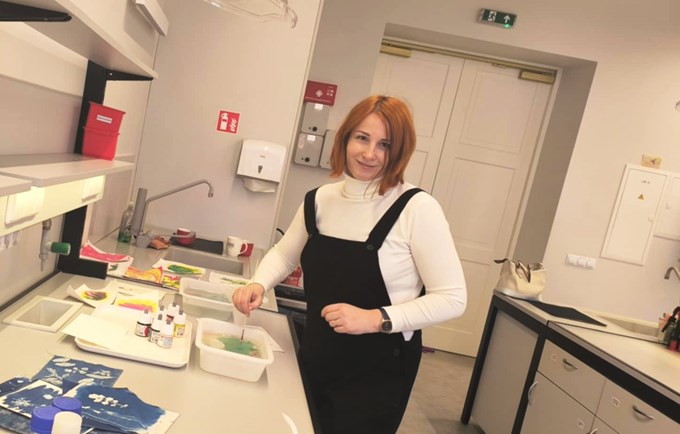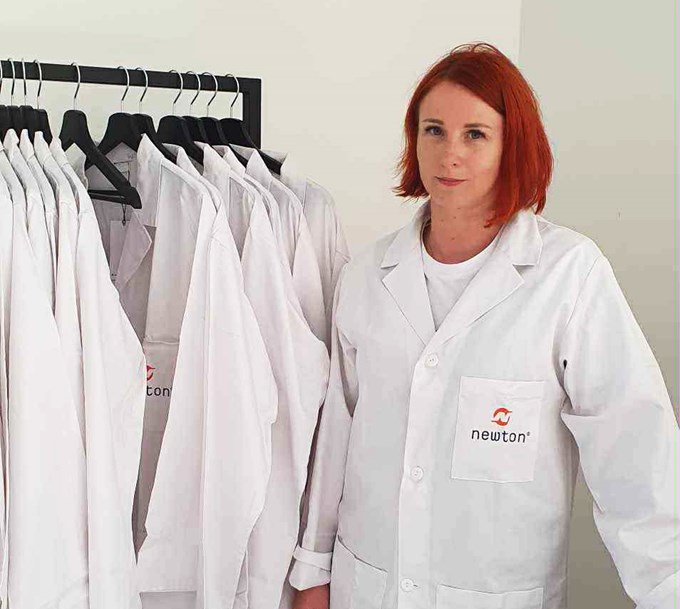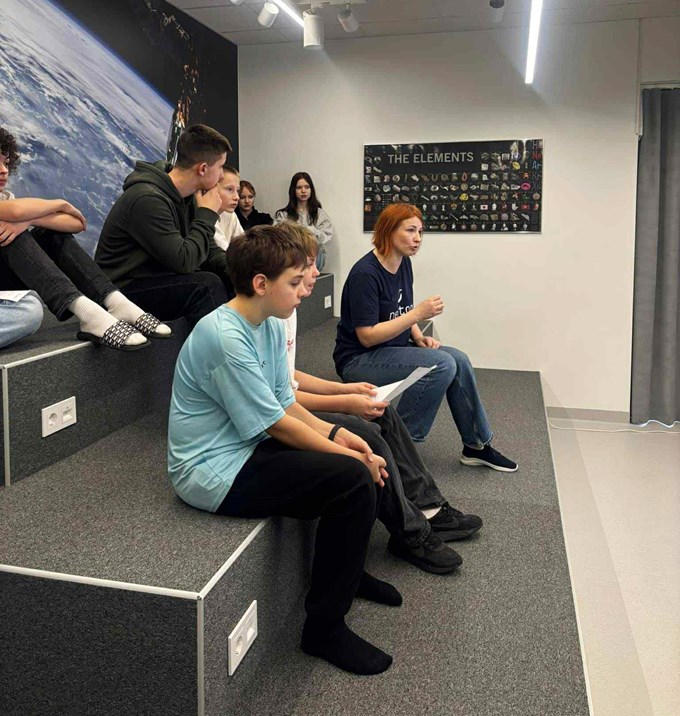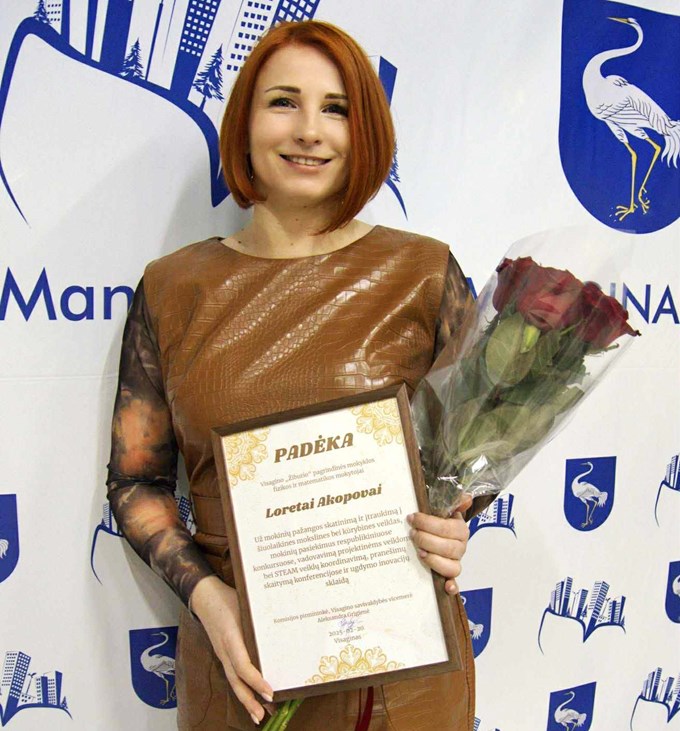Name: Loreta Akopova
Age: 47
My Newton Room: Newton Visaginas
Professional Background: Loreta is a physics and mathematics teacher at Visaginas “Žiburio” Primary School, with 25 years of experience.
Life Outside of Work
Loreta enjoys spending quality time with her family. She has three sons, and together they often attend nature education classes that help them better understand the environment. Her husband, who is of Armenian heritage, has a deep interest in Lithuanian culture and traditions, and dances in a senior folk dance group – an activity Loreta also enjoys. As a family, they love to travel and explore different cultures around the world.

What sparked your interest in STEM (Science, Technology, Engineering, Math) in the first place?
“While teaching physics, I noticed that students enjoyed hands-on activities. That led me to explore creative ways to make learning more practical and engaging. This inspired me to deepen my STEM knowledge and involve students in experiments and project-based learning.”
What do you love most about working in a Newton Room?
“I love seeing students enthusiastically explore theoretical concepts through practical experience. They experiment, ask questions, and are fully engaged in all STEM activities. I appreciate the high-quality methodological materials and the effective teaching methods, which enable every student to make discoveries and experience success while working with Newton Modules.”
What’s your favourite topic or module to teach, and why?
“My favourite module is ‘We Explore Energy’. It allows students to independently discover how energy shapes our world. They not only learn theory but also carry out experiments — like building tracks for rolling balls and vehicles — which sparks their creativity and curiosity. What inspires me most is their enthusiasm and problem-solving spirit. This module also fosters teamwork, resilience, and a positive learning environment.”

What do you hope students and teachers take away from their visit to your Newton Room?
“I hope they realise that science is not just theory — it’s about experimentation and creative thinking. Most importantly, I want them to feel inspired to explore, ask questions, and seek answers in their everyday lives. For teachers, the Newton Room also offers valuable methodological materials to enrich their science lessons.
It’s important to me that both students and teachers leave the Newton Room feeling joyful and full of new ideas.”
Can you share a fun or inspiring story that has happened in your Newton Room?
“While exploring energy, we held a vehicle rolling competition. The goal was to roll a student-built vehicle as far as possible. One student designed a very unusual model that didn’t seem efficient — but once it started rolling, it turned out to be one of the fastest! The excitement and enthusiasm were incredible.
Another memorable moment came during the ‘Robots and Circumference’ module. A student became very animated and excited during a challenge to program a robot to approach a figure without knocking it over. His emotions were contagious, and all the students watched eagerly. It was a fun and inspiring moment for everyone.”
How can we best inspire children and young people to pursue STEM education and careers?
“Hands-on, practical experiences — like Newton Modules — are key. When students experiment, explore, and create on their own, they become naturally curious. Meaningful STEAM projects that solve real-world problems are also vital. It’s important that students see the results of their work, and that there’s continuity in project-based learning. Access to modern technology and the encouragement of dedicated teachers are essential for motivating and empowering young learners.”
If you could meet one famous scientist, past or present, who would it be and why?
“If I could meet any scientist, it would be Nikola Tesla. He was a true genius who thought outside the box, and his inventions still impact our world today. I’d love to ask him where he found so much energy and inspiration for his ideas.”
What are three things on your bucket list?
-
Learn to control a drone and use it in the classroom.
-
Try an extreme sport—like skydiving.
-
Sail out to sea with a professional research team to observe orcas in their natural habitat.

Newton Visaginas
Visaginas Educational Support Service (Visagino švietimo pagalbos tarnyba) is a municipal public institution in Visaginas, Lithuania. Established in March 2007 and accredited by the Ministry of Education, Science and Sport, it provides educational and pedagogical‑psychological support tailored to the needs of the local community.
Its mission is to offer high‑quality services that benefit schools, teachers, students, and adult learners across the Visaginas municipality.
These services include educational guidance, psychological consultation, and support for non‑formal adult education and state language learning programs.
The Newton Room in Visaginas, operating under the guidance of Visaginas Educational Support Service, is Lithuania’s first-ever Newton Room, officially opened on October 4, 2024. It is the result of a partnership between Visaginas Municipality, FIRST Scandinavia and UAB Intersurgical.
Two Newton modules are currently offered:
“Robots and Circumference” (aimed at ages 10–12): A module with an emphasis on mathematical conversations and exploration of strategies for calculating the perimeter of two-dimensional figures.
“We Explore Energy” (ages 13–16): Makes the concept of energy tangible for learners through the exploration of various energy transformations and transfers.
The Newton Room in Visaginas is staffed by a team of 2 passionate and skilled teachers who specialise in STEM education. By creating a supportive and inspiring learning environment, the Newton Teachers play a key role in motivating young learners to explore complex scientific concepts and develop practical skills that prepare them for future careers in technology and engineering.
Loreta Apokova collaborates closely with Vilnius TECH and the Future Engineering projects, guiding students through annual, engineering-focused project work. Her contributions earned her recognition as one of the most active teachers in the 2023–2024 Future Engineering season.
In 2024, she organised STEAM training for local teachers at Vilnius TECH laboratories and coordinated STEAM activities under the "Millennium School - I" project. She has led qualification courses, teacher internships, and student workshops.
Loreta presented her work at the national School of the Future conference and has taken part in regional STEAM programs run by the Utena STEAM Center. She actively participates in teacher development camps, such as Spring of Research and Discovery and STEAM Researchers’ Summer. In 2025, she was nominated for the Visaginas Municipality Teacher of the Year award.
